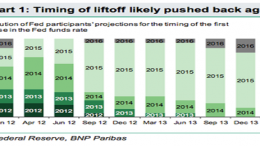The next stage of the Japan trade
LONDON | By Barclays analysts | There appears to be increasing market doubt over the sustainability of the “Japan trade”. Year- to-date, the yen has rallied more than 3%, while the Nikkei is down 11%, placing it among the worst performing indices of the year. This is due in part to concerns over the impact of the forthcoming fiscal drag as the VAT hike takes effect on April 1st.




